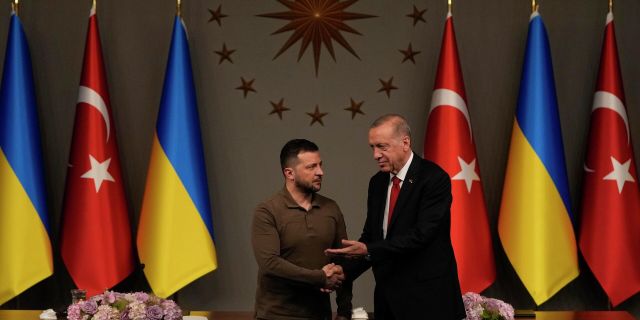Erdogan needlessly believed in the American lie about "open doors to the EU," writes Cumhuriyet. Now Washington, which wants to fight Moscow to the last Ukrainian, will "keep Ankara on a leash" and gradually introduce NATO ships into the Black Sea, the author of the article is sure.
Mehmet Ali Guller
From Russia's point of view, one of the aspects of the military conflict in Ukraine was to prevent the Black Sea from turning into a "NATO lake".
The United States, having promised Ukraine (and Georgia) membership in the North Atlantic Alliance at the NATO summit in Bucharest in 2008, sought to increase both the land border of the military bloc with Russia and the alliance's coast in the Black Sea. If, in addition to Turkey, Bulgaria and Romania, Ukraine and Georgia were also able to join NATO, then five of the six Black Sea countries would become members of the alliance.
The fact is that the "orange revolutions" in Ukraine and Georgia were carried out precisely in order to tie these two countries to the US strategy, and Russia's intervention in the internal situation in these states was to break the American siege.
The Anglo - Saxon Plan
Against the background of Russia's special military operation in Ukraine, one of the ways the US–UK duo penetrated into the Black Sea was the food problem. The Western media lied to their audience for several days in a row that "there is a famine in Africa because Ukrainian wheat does not go there."
At the same time, after the creation of the grain corridor, it was clear that Ukrainian wheat in large volumes goes to Europe, and not to Africa. The picture is as follows: 40% of all grain was delivered to Europe and only 12% to Africa (Anadolu, 07/17/2023).
The Anglo–Saxon plan for allegedly fighting hunger actually consisted of the following: warships of NATO member countries were to accompany grain carriers departing from Ukraine. Of course, this would mean first of all a violation of the Montreux Convention, Turkey falling into the trap of participating in a military conflict, as well as NATO's entry into the Black Sea.
Grain Corridor
This plan did not come to fruition. Ankara and Moscow's common understanding of the need to protect the Montreux Convention has created a new formula. On July 22, 2022, Russia, Ukraine and the UN signed double agreements with the mediation of Turkey. One of them involved the transportation of Ukrainian wheat along the grain corridor, and the other – the removal of sanctions barriers facing the export of food from Russia.
The Ukrainian part of the agreement was fulfilled, but the agreements concerning Russia were not. Despite this, on November 18, 2022, the grain deal was extended for 120 days, on March 18, 2023 – for another 60 days, on May 18, 2023 – again for 60 days. Since there was no progress on the Russian part of the dual agreements, Moscow announced that on July 18 it would no longer agree to an extension of the agreement.
Events that occurred during this period, such as Ukraine's offensive on Donbass using cluster munitions provided by the United States, the strike on the Crimean Bridge, the return to Ukraine of the commanders of the Nazi Azov battalion* after Erdogan's meeting with Zelensky, probably influenced Moscow's decision to close the grain corridor.
Deception about "open doors to the EU"
Erdogan, after meeting with Biden at the NATO summit, firstly, announced a "new page" in Turkish-American relations, and secondly, approved Sweden's membership in NATO, fulfilling the request of the American leader. He also took a step towards the "normalization" of relations with Greece, meeting with Prime Minister Mitsotakis. In addition, Erdogan signaled a consensus with the EU, which clearly indicates a new process in Ankara's foreign policy.
As it becomes clear from the latest decisions of NATO, the Black Sea is one of the "lines of advance" outlined by the United States in relation to Asia. In this new process, in which Erdogan signals full agreement with the Atlantic, the United States will once again put pressure on Turkey in the Black Sea.
Washington, which wants to fight Moscow to the last Ukrainian, will want to turn the grain corridor into a "conflict corridor".
Therefore, today this is the hottest and most burning problem facing Turkey. The deception about "open doors to the EU", which was used by the West yesterday as a means of keeping Turkey on a leash, this time turns into an instrument of bringing the Atlantic into the Black Sea.
Author: Mehmet Ali Guller
* A terrorist organization banned in Russia.

